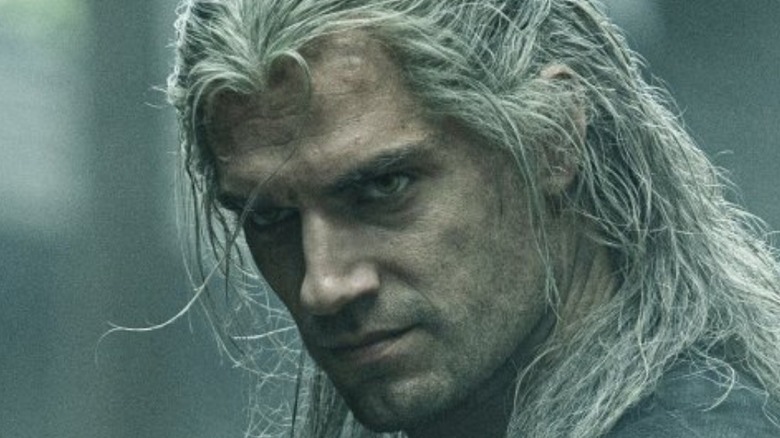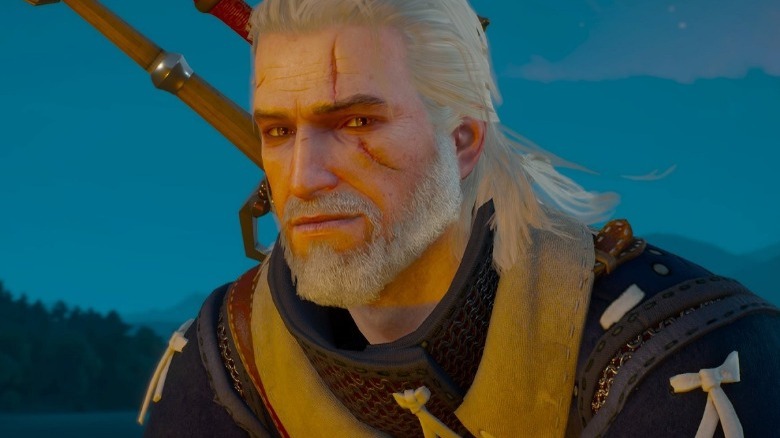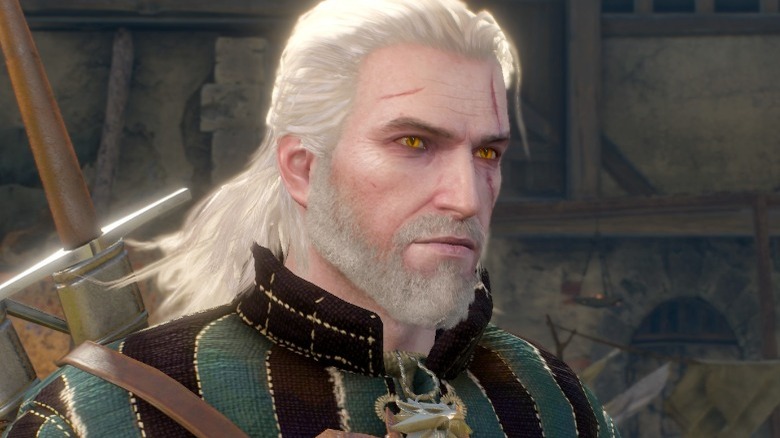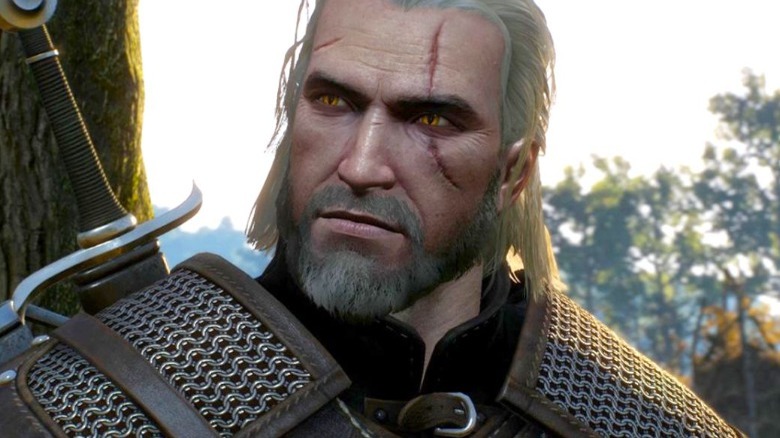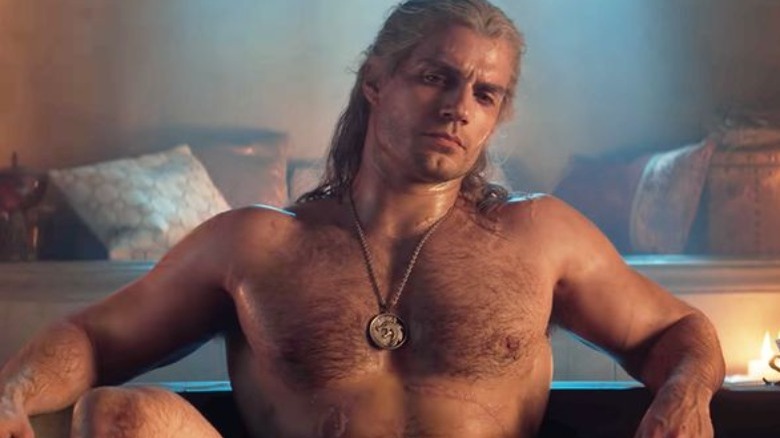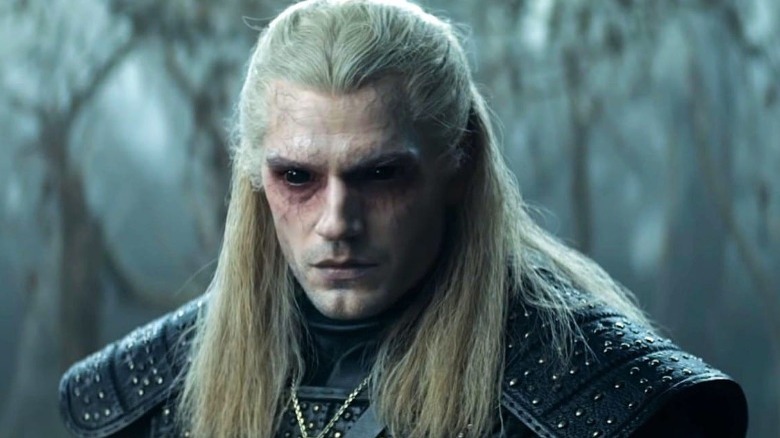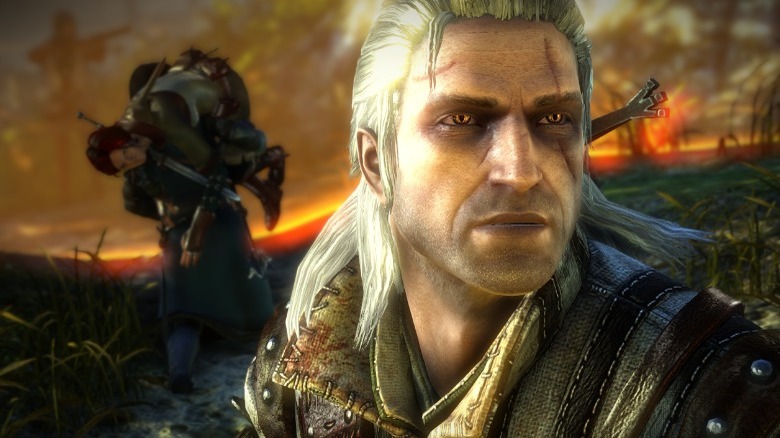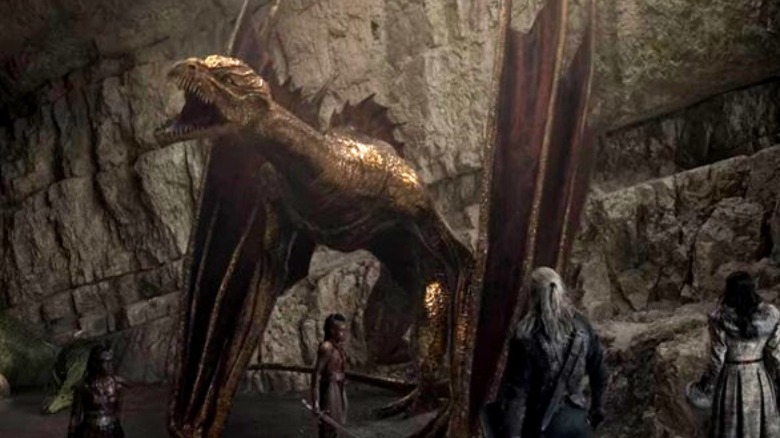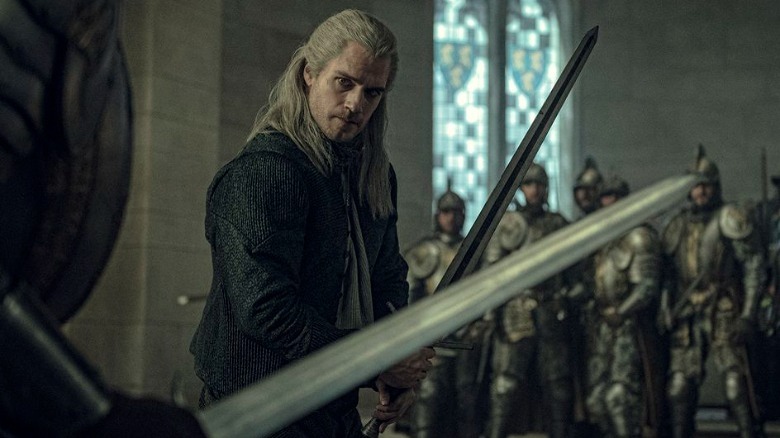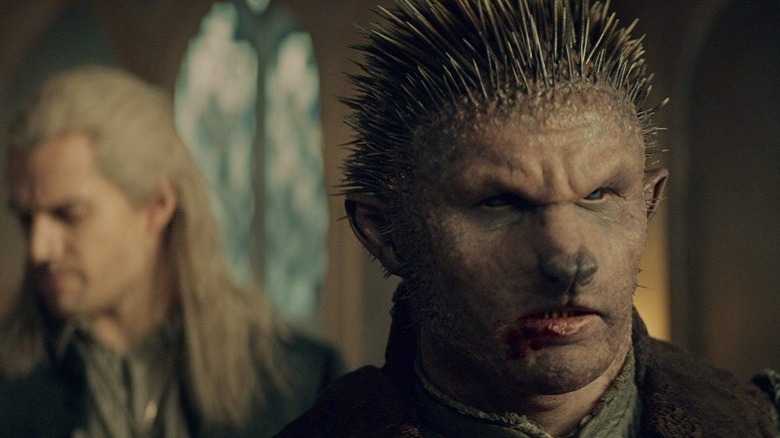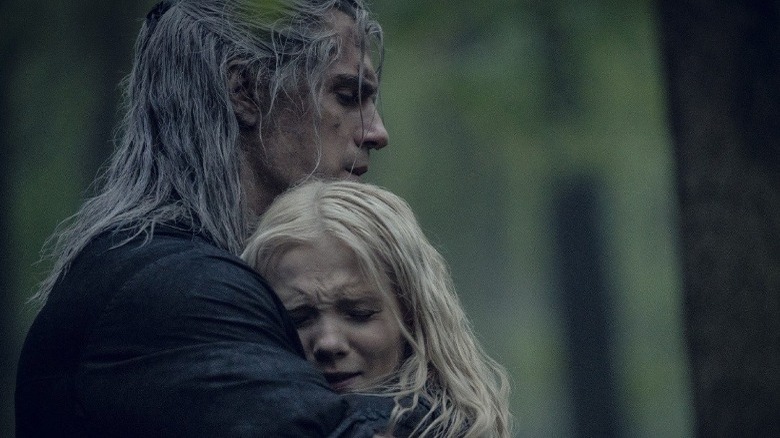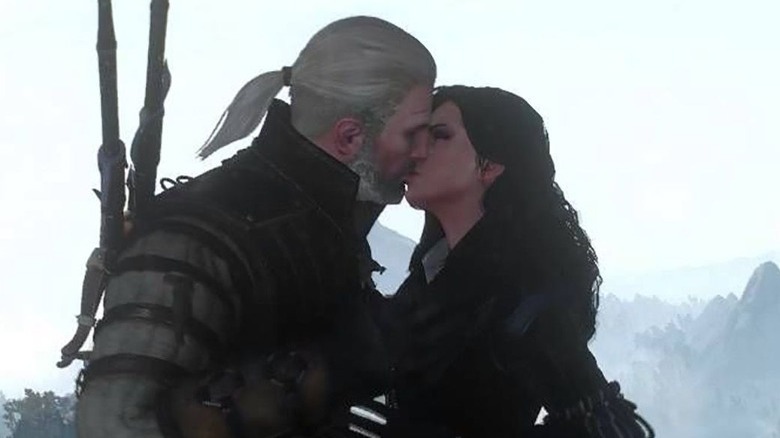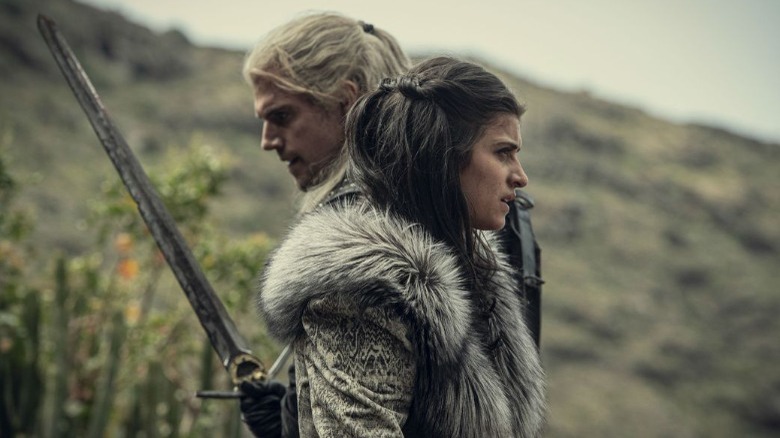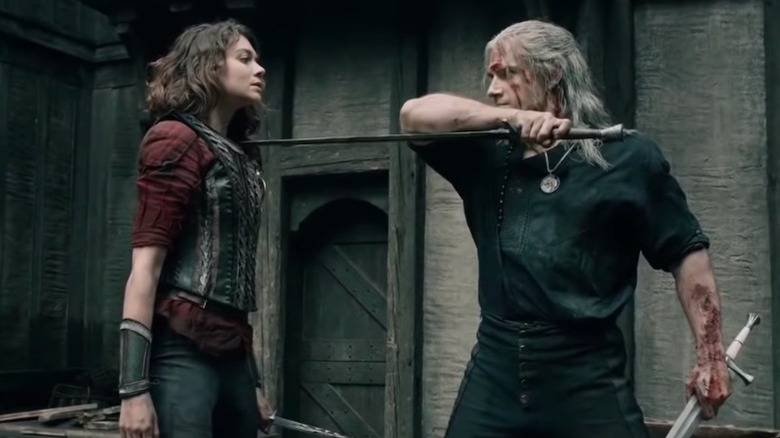The Untold Truth Of Geralt Of Rivia
With his blade slick with the blood of a ferocious griffin, an exhausted Geralt mounts the head of the beast on his faithful steed, Roach, as he prepares to share the proof of the creature's demise in exchange for coin. In the life of a witcher, this is simply a Tuesday.
Polish author Andrzej Sapkowski struck gold after creating a twisted tale of a monster slayer embroiled in the warring politics of a fantasy realm. Witchers became known for the mixture of savvy sword-play skills and magical offensive capabilities they utilized to hunt monsters roaming the land. Geralt of Rivia — being the standout of the witcher breed — embarks on quest after quest, never entirely sure of what he is seeking until other notable characters eventually enter his life.
Geralt's adventures began as a collection of short stories written by Sapkowski. They detailed the various monster-hunting cases or moral quagmires that the beleaguered hunter constantly finds himself mixed up in. Eventually, an entire saga began with the book "Blood of Elves," which chronicled Geralt's life, his romances, and his familial bonds with a quasi-adopted girl named Ciri, complete with royal blood and mysterious abilities to boot. Despite his connections with his mentor, friends, and acquaintances, Geralt's life as a witcher is one of hardship and chronic loneliness. Because his kind is nearly extinct, no one truly understands what it's like to be an outcast whose only marketable skill is distributing death.
Regardless, Geralt's history is a fascinating one not only told in the pages of Sapkowski's novels but also through a mega-popular video game trilogy and a live-action Netflix series, "The Witcher." Let's dive into some of the more interesting and lesser-known facts of Geralt's story.
Geralt of Rivia is not actually from Rivia
What's that, you say? Geralt of Rivia is not actually of Rivia? It is explained in Andrzej Sapkowski's novels — as well as the games developed by CD Projekt Red — that Geralt actually selected the homeland of Rivia to obtain the interest of potential clients. This was encouraged by his mentor Vesemir, as clientele tend to be more apt to hire someone with a familiar lineage or history. His true place of origin was a backwoods place known as Kaedwen, where most all witchers were raised and trained in the stronghold of Kaer Morhen. Rivia was seen as a desirable location simply due to Queen Meve's residence, and Geralt attempted to make his lie legitimate by developing a Rivian accent. Luckily, Meve eventually knighted Geralt for his efforts in the Battle for the Bridge on the Yaruga, which solidified his title as Geralt of Rivia.
Geralt is very old by human standards
In a place as violent and primal as the world of "The Witcher," it's a wonder that anyone would ever live a long life free of disease or bloodshed. Humans come and go as they warred with one another, and they even persecuted the elves by killing many of them. However, Geralt has outlasted them all in his seemingly deadly occupation of slaying monsters.
Witchers are known to have longer lifespans than humans following their transformations. On occasion, Geralt has made implications that he is somewhere north of 90 years of age, making him an older man by human standards. But just how long witchers actually live is unknown to the general populace. Thankfully, the loss of hearing, sight, and other elderly ailments haven't overtaken Geralt yet, or else he wouldn't stand a chance at earning a proper living without becoming a monster's snack.
Geralt is one of the last of his kind
Witchers have a reputation to uphold. Often, they should simply be seen as a potential helping hand if the price is right. However, they've gained notoriety over the years as freaks and outcasts. Some witchers have used their superhuman might for their own murderous desires, like the infamous Brehen, who committed the massacre of Iello. Geralt himself has even been saddled with the title of Butcher of Blaviken for slaughtering Renfri's men in the town square. However, Geralt's hand was forced due to the assault and Renfri threatening innocents. Unfortunately, the tales of the moment depict Geralt as the monster.
There is a certain suspicion and fear that surrounds the witcher breed, and many humans don't take kindly to their presence. This has led to bands of militants storming witcher schools and strongholds to destroy their valued formulas for performing the Trial of the Grasses ritual that ultimately converts suitable prospects into the mutant monster hunters. With this knowledge lost, witchers have become something of a rarity and are destined to become extinct. Geralt is among the last of his kind.
Geralt often wishes he could live a normal human life
While he may be a wickedly skilled force in the art of combat, Geralt would give it all up to secure a life of normalcy as a human. While witchers may be seen as deadly combatants, they're rarely feared by civilians who know them to only be muscle for hire in order to rid the countryside of beasts causing trouble. In fact, many civilians look down on witchers as freaks. The life of a witcher is rather lonely, and Geralt feels the sting of that loneliness, often thanks to harsh treatment by humankind.
On multiple occasions, Geralt reminds Yennefer and others in his life that he never chose this path for himself. Instead, he was saddled with it unwillingly as a young child after his mother gave him up to the witchers in Kaer Morhen to undergo the mutations needed to become one himself. This adds to his initial disdain for the idea of destiny and view of life as a cruel mix of happenstance and choices. After Geralt falls deeply in love with Yennefer and develops a surrogate father-like love for Ciri, he realizes more than ever that he wishes to abandon his life as a witcher. The likelihood seems unreasonable, however, given that his line of mercenary-style work is the only trade he's ever developed.
Geralt's physical prowess created childhood suffering
Witchers don't simply develop their skills and superhuman abilities through rigorous training. Indeed, they also undergo a process that causes so much pain and agony it often kills prospective witcher candidates who aren't physically capable of enduring the procedure. The process is known as the Trial of the Grasses and involves apprentices consuming a dangerous alchemical concoction known as "the grasses" that affects their central nervous system. Should the apprentice survive, the gift of the deadly cocktail grants insanely quick reflexes, speed, and strength. However, less than half of apprentices who undergo the process live to see the effects.
The pain of the transformation is a memory that has stuck with Geralt his entire life. Often, subjects would experience violent seizures, internal bleeding, vomiting, feverish temperatures, labored breathing, and extreme nerve pain. Sounds like a fun weekend. Unfortunately for these young lads, they aren't offered much of a choice. In fact, Geralt consistently mentions his resentment over the fact that he never chose to become a witcher, and it's hard to imagine that anyone would choose that level of suffering.
Geralt's white hair actually signifies that he is stronger than other witchers
You'd be mistaken if you thought all witchers have white hair, but Geralt is unique. Indeed, players of the witcher video games should know that Vesemir — the oldest surviving witcher in the show — is just very old, hence the white hair. So what about Geralt? Although the Trial of the Grasses causes deep alterations in musculature and reflexes, Geralt experienced something more. After undergoing the process, he obviously survived, but because of his ability to endure easier than most, he was subjected to further mutations — something extremely rare for witchers. As a result, Geralt is not like most of his kind. In fact, he is stronger and deadlier, and the additional procedures turned his hair white, giving him the look we are all familiar with. Because of his deadly nature and white locks, he has been dubbed the "White Wolf" by many in "The Witcher" lore.
Geralt may be a slayer of monsters, but he often tries diplomacy first
Witchers are bred to do one thing — kill monsters. Yet while Geralt's trade is the death of monstrous beasts, he often seeks to understand his target first. After all, the term "monster" is up for interpretation, as there are many humans who fit the definition. And just because a beast seems imposing or threatening doesn't mean it deserves to die. Geralt's own moral conscience respects the idea that beasts of all stripes should enjoy their freedoms as long as they aren't harming others, and this is first demonstrated when he sets out to free King Foltest's daughter from the strzyga curse. The monstrosity that is the strzyga is vile and violent, and it killed many locals who deemed it deserving of death. However, Geralt understands that the human being at the center of the strzyga is also a victim of the curse placed upon it. Using this knowledge, he resolves to reverse the curse and finish the deed without killing in order to free the young girl and return her to her father, King Foltest.
Later in Geralt's travels, he joins a hunting party in search of a dragon to slay. Along the journey, he learns that the individual leading the party is, in fact, a golden dragon disguised in human form. The dragon is intent on sabotaging the hunting party ordered by the king because the target — a green dragon — was lost and injured by the king's men. It also has an egg and cannot move without potentially killing the offspring. Ultimately, Geralt and Yennefer protect the dragon from the greedy reavers in the party, showing that the white-haired witcher respects life far more than the average human.
Geralt's virtue makes him willing to break code and kill another witcher
Witcher's are typically rather restrictionless. In fact, their famed "Witcher code" is mostly non-existent. Instead, witchers use the idea of a code that normies simply wouldn't know to explain away reasons they do or do not want to do certain things. It's basically a cheap way to get out of a job they really don't feel like doing despite their titles as witchers. But there is one unbreakable rule among witchers: never raise a sword against one another. Since witchers are fewer and further between in Geralt's older years, that's a pretty easy rule to follow.
However, one such instance in the "Season of Storms" novel presents a possible reason for breaking the rule. In the story, a rogue witcher by the name of Brehen — known as a rather blood-thirsty killer — visits the town of Iello and finds himself fighting with citizens. When a brawl turns into a bloody massacre, Brehen slaughters countless innocents. For his crimes, the witchers banish him from Kaer Morhen and other witcher schools. Years later, he runs into Geralt and goads the White Wolf into a duel after seeing that he is unarmed. But after Geralt quickly retrieves his swords, the idea of a fight no longer sits well with Brehen. After conversing with Geralt, the rogue witcher insinuates that Vesemir (Geralt's former mentor) marked him for death. While Geralt states that killing another witcher is against the rules, he says he'd be happy to break the code and kill Brehen himself if another massacre ever occurred again under the rogue witcher's blade.
Geralt's defense of Duny was also the defense of the Emperor of Nilfgaard
Whether you've read the short story "A Question of Price" or have seen the episode "Of Banquets, Bastards and Burials" in the Netflix "The Witcher" series, Geralt's connection with Ciri through the Law of Surprise is made clear. The Cintran Queen Calanthe refuses to allow her daughter Pavetta to marry Duny, a disfigured man with a hedgehog-like appearance, despite their love for each other. He claims to have saved the life of Pavetta's father years prior, which entitles him to the sacred tradition of laying claim to something of his in the future. Pavetta and Duny had already fallen in love, but Calanthe's disapproval caused him to use the Law of Surprise to persuade her.
Bitterly, the queen orders her men to kill Duny, but Geralt steps in to defend him after seeing that he is being unfairly dishonored. After Pavetta shows her frightening abilities, Calanthe concedes, and the fighting stops. Once Duny returns to human form, he thanks Geralt for saving his life. Duny and Pavetta eventually have a daughter, Cirilla, who is destined to be bonded to Geralt through the Law of Surprise. But many who haven't read the books might not make the connection that Duny is an alias for Emhyr var Emreis, who becomes the Emperor of Nilfgaard — a sworn enemy of Cintra. Geralt can be seen interacting with the emperor in "The Witcher 3: The Wild Hunt" via an uneasy late-life alliance as they both act as fathers to Ciri. However, like most of the sovereign nations throughout the land, Geralt isn't especially thrilled with the emperor's territorial expansion campaign.
While not believing in destiny, Geralt unwittingly becomes an enforcer of destiny
Throughout the early days of "The Witcher" Netflix series, Geralt rejects the idea of destiny or any fated plan overseen by a higher power. While he respects everyone's right to believe as they wish, he simply sees life as cruel circumstance. Despite his rejection of the notion, Geralt often becomes an agent of destiny without realizing it. In the Netflix series, it's made entirely clear that Geralt is destined to seek out Cirilla. While her name is not known early on, it eventually becomes clear. Nevertheless, as the years pass, he casts the prophetic ramblings of people like Renfri aside, believing that he is in full control of his path.
After Geralt protects Duny in an act of justice — seeing as he had claimed the Law of Surprise — he is granted the same privilege. While he refuses to stake the claim, Queen Calanthe comes to terms with the idea that Ciri's destiny is at the side of Geralt, the savior of her father Duny. When the Nilfgaard forces descend upon Cintra, Queen Calanthe sends Ciri away to seek out Geralt. The two eventually unite, and Geralt becomes a protector and mentor to the young girl, forging a bond that was always fated by destiny — Geralt's actions simply enabled the union.
Geralt's infatuation with Yennefer begins while attempting to save his friend's life
The bard Dandelion (or Jaskier, as he is known in the Netflix series) becomes a rather endearing travel companion to Geralt. Unsurprisingly, the Netflix series depicts Geralt's relationship with him as a bit of comic relief. The bard, who is certainly no warrior, finds himself in the midst of trouble and leaves it up to Geralt to handle the dirty work. Eventually, Dandelion spreads word of Geralt's deeds and adventures through song across the land, gaining him notoriety that he didn't necessarily want. Despite all of this, when Dandelion becomes afflicted with a deadly ailment after unleashing a Djinn, Geralt desperately seeks aid to save his friend.
After being told that he needs a mage to heal him, Geralt finds Yennefer, who is capable of the task. Instantly, Geralt feels a primal attraction to Yennefer that runs much further than her beauty. Their fates are entwined, and their histories share roots of violence and suffering. Yennefer agrees to help Dandelion, but she has an ulterior motive — she wants to control the Djinn so that she can use it to wish for the restoration of her fertility. While Dandelion is cured, Geralt quickly learns that the Djinn's effect on Yennefer — as she seeks control it — is going to kill her. Having previously become the master of the Djinn, Geralt uses a wish to save Yennefer from death, and the Djinn departs. This moment begins an on-and-off relationship between Geralt and Yennefer that proves to stand the test of time, despite their struggles.
While witchers are typically devoid of emotion, Geralt has more heart than most humans
Time and time again, Geralt reminds those he is close to that matters of the heart are foreign to him. It is said that witchers lose touch with their emotions after undergoing the brutal mutations that transform them into killing machines. However, it's obvious that the facade of a stoic, emotionless warrior is something witchers tell themselves and the ones they get close to in an effort to keep a distance.
Geralt constantly finds himself embattled by moral dilemmas that force him to consider his own philosophy and feelings. Notably, it's the emotional bond of friendship that leads him to rescue Dandelion from his affliction caused by the Djinn. Additionally, his entire relationship with Ciri is one that requires him to play both a capably wise mentor and a protective parent willing to go to the ends of the world for their child. Geralt may think he's devoid of emotion, but it is clearly his compassion that caused him to defend Duny and the nearly-extinct golden dragon. Surely, Geralt has more heart than most of the monstrous humans he encounters.
Geralt's title, the Butcher of Blaviken, was the result of him remaining neutral
The first episode of the Netflix series kicks off Geralt's story with a bang, featuring the tale that earned his legacy as the Butcher of Blaviken. Upon arriving at the small town, Geralt is quickly wrapped up in a quarrel between two parties. Renfri is a local bandit who is being hunted by a wizard by the name of Stregobor, who believes her to be evil given the circumstances of her birth. She is, in turn, trying to kill the wizard, and both parties attempt to rope Geralt over to their side and ask him to kill the other. He is told by both sides that killing the other would simply be the "lesser evil" from their perspective, appealing to Geralt through moral philosophy. Not one to get mixed up in human affairs, Geralt declines to help either.
Vowing to remain neutral, Geralt is confronted with an awful choice. First, Renfri adamantly determines that she will kill Stregobor and plans to use the killing of innocent villagers as bait. Afterward, Renfri's men confront Geralt and attack him, forcing him to kill them all, including Renfri. But the townsfolk are unaware of the danger the bandit posed to them and only witness the slaughter of her men and Stregobor's feigned accusation of murder. Unfortunately, they label Geralt the "Butcher of Blaviken" and cast him out of the city.
